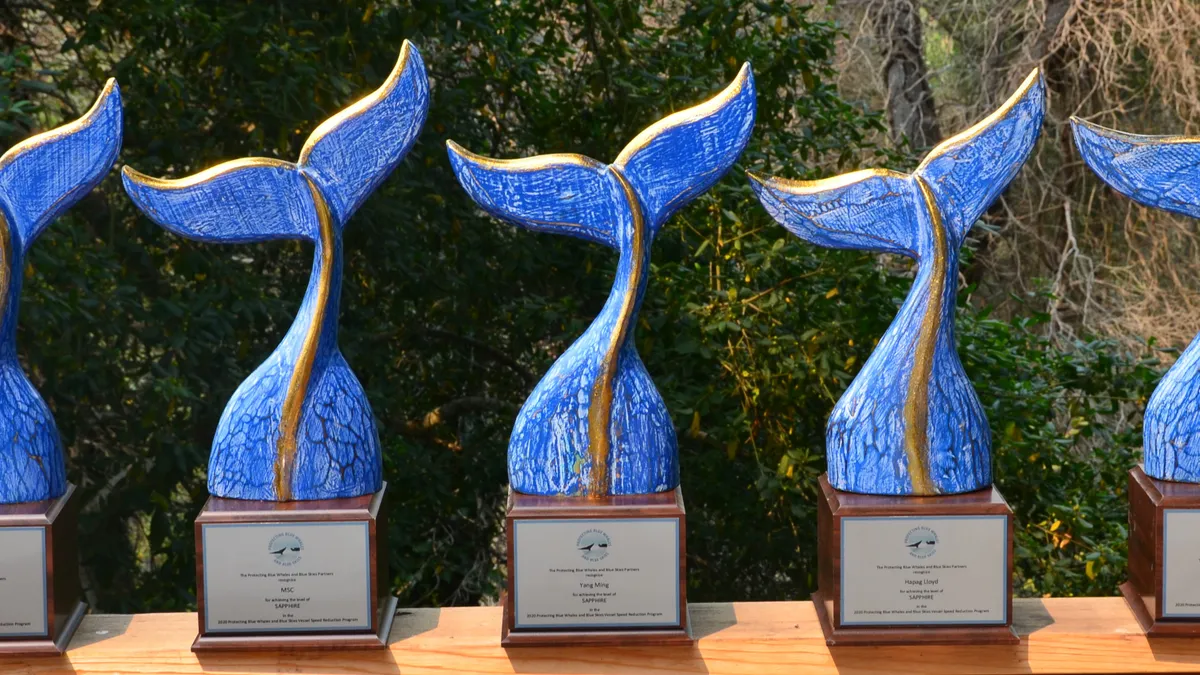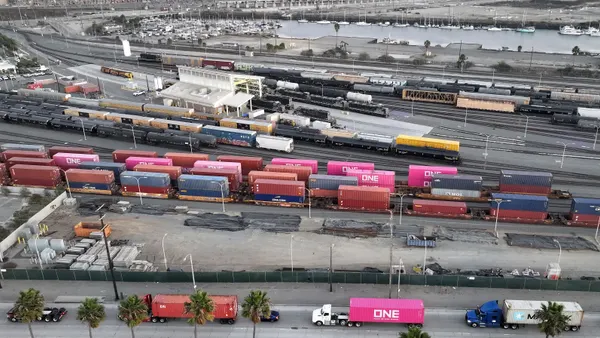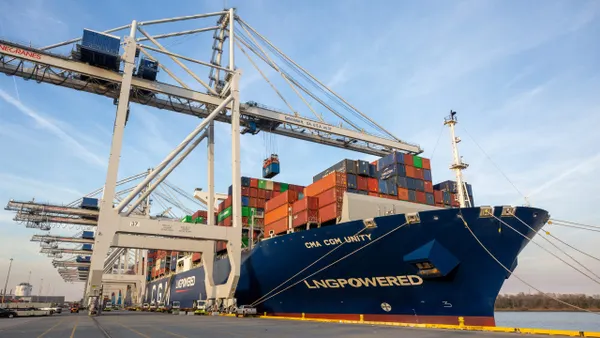The world's largest ocean-going carriers are slowing down to reduce emissions and protect whales. Shipping companies that successfully reduced speeds to 10 knots or less in the San Francisco Bay Area and the Southern California region received awards in an initiative to cut air pollution and protect endangered whales.
The voluntary vessel speed reduction incentive program, called "Protecting Blue Whales & Blue Skies," ran May 15, 2020 through November 15, 2020. The 2021 program began May 15, 2021 and ends November 15, 2021.
Supporting Sustainability
What does the program mean to shippers and their customers? For companies seeking a more sustainable supply chain, carrier selection can make a difference for whales and the environment. And if you are using one of the recognized carriers in and out of California ports, your company is already supporting sustainability.
Ship strikes are a major threat to whales globally and to the recovery of endangered blue, fin, and humpback whales in California waters. Reducing the risk of ship strikes is a priority of the National Oceanic and Atmospheric Administration (NOAA), including NOAA's West Coast national marine sanctuaries. Observed and documented deaths totaled 49 endangered whales from 2007-2020, and likely represent only a small fraction of the total number of ship strikes taking place annually.
As whale strikes continue to make headlines, it is likely that more and more consumers will demand shipping companies and their customers be held accountable. Brands that proactively work to address these issues stand to distinguish themselves as environmental leaders.
The timing of the program also coincides with the season when ground-level ozone (smog) concentrations are typically high. The 10-knot target allows ships to travel at an efficient operating load using less fuel and producing less pollution, including greenhouse gases. It is estimated that global maritime shipping contributes over a billion tons of greenhouse gases each year.
Performance Award Tiers
Shipping companies were recognized based on the percentage of distance their fleet traveled through Vessel Speed Reduction (VSR) zones at speeds of 10 knots or less. The three award tiers are Sapphire (75-100% of fleet total distance in VSR zones traveled at 10 knots or less), Gold (50-74%), and Blue Sky (25-49%). Automatic Identification System (AIS) transponders on each ship transmit the ship's speed, heading, and location; AIS data was analyzed for each fleet and the company's performance was classified by tier. Companies that performed at Gold or Sapphire level were awarded a financial incentive.
Shipping Companies Recognized
In 2020, MSC, Hapag-Lloyd, Yang Ming, and MOL ACE notably achieved the Sapphire tier in the large company category (greater than 30 transits) by slowing down more than 800 transits, combined. Swire Shipping achieved the Sapphire tier in the small company category (less than 30 transits). For their outstanding commitment, all five of these companies earned the Protecting Blue Whales and Blue Skies Whale Tail award.
Seven companies – COSCO Shipping Lines, Evergreen, GALI, "K" Line, Maersk, Wallenius Wilhelmsen, and Swire Shipping – generously declined their financial incentive payment. Those funds will be used for additional public recognition efforts and reinvested in the 2021 program.
Environmental Benefits
As compared to baseline, an approximate 25% reduction in NOx pollution was seen from the ships that participated in the program, with over 24,000 metric tons of reduced regional greenhouse gases. There was a 35% decrease in the risk of ship strikes on endangered whales for vessel transits when compared to what would have occurred had the vessels traveled at their normal, faster speeds. Shipping fleets in the Sapphire, Gold, and Blue Sky award tiers had sound levels that were approximately 4 decibels per transit less than fleets that did not slow their speeds. With a reduction in noise pollution emitted, whales can likely communicate easier.
Sustainable Maritime Shipping
Is your company shipping goods on vessels that are slowing down to protect whales and reduce air pollution? "Protecting Blue Whales & Blue Skies" program contributes to sustainable maritime shipping, and you can benefit. Working with companies who succeed in the program can benefit your supply chain, your customers, and the health of the planet.
For more information about environmental benefits achieved by these suppliers, visit https://www.bluewhalesblueskies.org. If your company is interested in "Protecting Blue Whales & Blue Skies," go to https://www.bluewhalesblueskies.org/retailers, or contact Jessica Morten ([email protected]).










